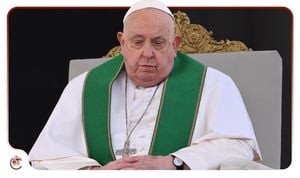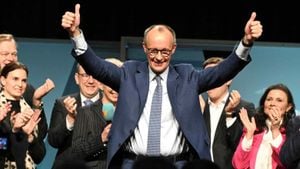Saudi Arabia has emerged as a pivotal diplomatic hub, underscored by the recent high-level talks between the US and Russia held on February 18, 2025, aimed at re-establishing fractured relations and addressing the war in Ukraine. These meetings, hosted in Riyadh, highlight the Kingdom's growing influence on the international stage, positioning it as a bridge between East and West amid increasing global tensions.
The talks marked significant diplomatic engagement, featuring key officials such as US Secretary of State Marco Rubio, National Security Adviser Mike Waltz, and Russian Foreign Minister Sergey Lavrov, among others. This high-stakes dialogue is set against the backdrop of deepening divisions resulting from Russia's invasion of Ukraine, which began on February 24, 2022.
According to Dr. Abdulaziz Sager, founder and chairman of the Gulf Research Center, Saudi Arabia's neutral stance has positioned the Kingdom as the ideal convener for such discussions. "Saudi Arabia has taken an important position... neither with the Russians nor with the Ukrainians," Sager explained during his appearance on the Arab News program "Frankly Speaking." This unique diplomatic position has allowed Saudi Arabia to maintain favorable relations with both Russia and Western allies throughout the Ukraine conflict.
Media outlets, including CNN, have pointed out Saudi Arabia’s aspirations to play a larger global role, emphasizing the Kingdom's capability of mediaging international conflicts. The importance of these talks extends beyond the Ukrainian situation; they also address and seek resolutions to broader issues, including sanctions and the status of frozen Russian assets. Some reports indicate discussions about easing restrictions on credit card usage for Russians as confidence-building measures aimed at fostering dialogue.
While Ukrainian President Volodymyr Zelensky was not directly involved, Sager noted he was aware of the consultations taking place. Subsequent meetings involving European foreign ministers suggested the intention to keep Ukraine apprised of developments, as fears of excluding the nation from any peace negotiations have surfaced. The urgency for inclusivity remains, particularly with Zelensky firmly stating he would not endorse any peace deal negotiated without Ukraine's involvement.
Despite Ukraine's absence from the February talks, Sager highlighted their broader significance, indicating intentions to shape long-term strategies for US-Russia relations and envision future dialogues involving Ukraine once initial groundwork is completed. Looking forward, Sager assured, "Definitely, Ukraine will participate... clearly stated by the US side there will be participation from the Ukrainian side and the Europeans." He also addressed how Saudi Arabia is asserting its political influence as discussions progress and as the Kingdom hosts talks pivotal for the region.
The conversation surrounding Gaza remains equally pressing. Sager reiterated Saudi Arabia's unwavering commitment to the two-state solution, sharply criticizing US proposals implying the resettlement of Gazans or transforming Palestinian territories for real estate development. "The Saudi position never changed... insisting on the two-state solution," he remarked, reflecting widespread regional sentiment against alternative strategies deemed unacceptable by Arab nations.
With upcoming meetings forecasted to focus on peace talks and the future of Gaza, Sager emphasized the necessity of coherent dialogue and mutual recognition of Palestinian voices. Calls for unity among Palestinian factions present the potential for establishing stable governance, alongside the importance of including diverse political factions, even those like Hamas, recognized by some as terrorist organizations.
Sager's insights extend to the importance of continued efforts to address humanitarian issues, and he highlighted the need for systematic approaches toward conflict resolution across the Middle East. “There are many cases still open... we have almost seven countries in failed states,” he acknowledged, referring to extensive challenges including Yemen, Sudan, and Syria. He projected cautious optimism amid promising developments, mentioning what he views as the need for more diplomatic engagement to realize peace and stability.
While services like ceasefires and hostage exchanges have indicated positive momentum, Sager maintains the region requires substantial effort going forward. The situations surrounding Gaza, the Middle East peace process, and regional cooperation will remain salient topics as Saudi Arabia continues its evolution as a key player on the world stage.



